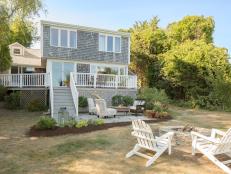Active Seniors Find Convenience and Comfort in Retirement Communities

Stockbyte
Leigh Ersevim, who is in her 60s, sold her older home in Rhode Island and bought a new cape-style, three-bedroom home in the subdivision to be closer to her grandchildren. It’s also allowed her to meet people her own age. "I didn’t want to retire and be isolated up here," said the divorcee and former nurse.
Ersevim is illustrative of a growing wave of baby boomers -- those born between the years of 1946 and 1964 -- choosing to move into 55-plus active senior communities.
Booming Demand
The National Association of Home Builders forecasts a growing demand for such communities as the 55-plus population exceeds 85 million by 2014.
Many people, like Ersevim, are trading older houses for new homes that offer energy efficiency, great rooms, open floor plans, high ceilings and large windows for sunlight, said Jane O’Connor, an expert on the 55-plus population, publisher of Mature Living Choices magazine and immediate former chair of the 50+ New England Housing Council for the National Association of Home Builders.
Not for Everyone
But Nancy Thompson, a spokeswoman for AARP, formerly the American Association for Retired Persons, said the market for 55-plus housing is a niche that doesn’t apply to every -- or even most -- baby boomers.
A study done by AARP in 2006 found that 90 percent of boomers want to stay in their current home as long as possible, she noted. "The other 10 percent who move, a large chunk stay within the county," she said. There is anecdotal evidence that those who move farther tend to do so to be closer to children and grandchildren, or to relocate to walkable urban areas or college towns.
O’Connor believes that survey is no longer current given skyrocketing energy prices over the past few years. When grown children leave the home, heating and caring for a large home can become a burden, she said.
For Ersevim, the move was ideal. She sold a large older house with a detached garage and bought the new 1,800-square-foot home about two years ago for $314,000. She was one of the first people in the development. Now the neighborhood is almost sold out and new houses are being constructed all around her.
The Exception?
So far the popularity of age-restricted projects has been uneven, with some communities such as Phillips Farm selling out -- even in today’s down real estate market -- and others languishing.
The developments that are suffering tend to be "cookie-cutter" subdivisions, O’Connor said, where all of the houses look alike or similar.
"Boomers are demanding something different," she explained. "They were the first generation to question authority, change styles and music. They changed everything they touched, from the creation of suburbs to mini-mansions. Now they’re saying 'we don’t want cookie-cutter houses, we want choices, customization. We don’t want a house that looks like every other one on the block.'"
On a tour through the house, Ersevim pointed out the high ceilings, gas fireplace, sunroom, first-floor master suite and two bedrooms upstairs. She saved her favorite "room" in the house for last -- the two-car attached garage.
"I love my garage," she said with a smile.












































